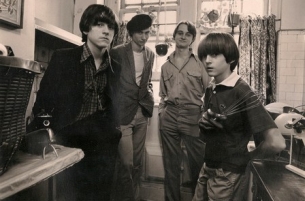
Whitehouse Post Documents a Musician's Metamorphosis into Editor

Editors and music go hand-in-hand. Barney Miller out of the Whitehouse Post New York office is yet another example of this phenomenon.
Before the Beastie Boys or Red Hot Chili Peppers— Barney's band - Miller, Miller, Miller & Sloan - were experimenting with funk, R&B, rap, and electronic. They opened for bands like The Clash, Tom Tom Club, and Chaka Khan at clubs like The Ritz and CBGB.
They were not only among the first to fuse funk and rock, but they also helped pave the way for electronic music—building and programming their own instruments and microchip technology with an Atari typewriter.
And Lucy Kostelanetz documents their journey, spanning not just 24 years of awesome eyewear and hair styles, but also the growth of the band and the band members in the process of realizing the relationship of their dreams and reality. The documentary delves into the resiliency, resourcefulness, and creativity born of the pursuit of dreams, and how the passage formed four young artists into four grown men.
Hear a few words from the man Barney Miller himself—frontman, music video director and editor who went on to carve his career in editing, opening his own editing house and later joining up with Whitehouse Post in New York.
Q> How did the documentary come about?
BM> Lucy was the stepmom of one of our friends. She just approached us while we were playing at a club, and we were like, “Okay. Sure!” It seemed like a fun project. She had a full-on production crew, but the overall vibe was very casual and familiar. We had a lot of fun, and I think that translates to the film. She interviewed us in ’83 and stayed in touch over the years, rounding us up for another set of interviews in ’88 and again in 2007-2009.
Q> What did you think about it while you were filming it?
BM> Oh, we were having a lot of fun. Even in ’88, despite not yet securing a record deal, we were having fun experimenting with the electronic and technical side of things with Sloan playing the bass that he and Dan created and built. We were also making a lot more music videos in that period, where I obviously found a lot of inspiration. So while we were beginning to balance our dreams against reality a bit more, we were still having a lot of fun with it. And later, of course, it was wonderful to recall all the memories and see how we had all evolved from our roles in the band into professionals.
Q> How did you feel when you first saw it?
BM> Hesitant. I first saw it at a screening, and I wasn’t quite sure what the vibe would be. You’re basically opening up a large portion of your life and yourself to a roomful of strangers, so there was definitely some adrenaline involved. But Lucy did a wonderful job, and it was really nice to revisit those moments and memories. The best part is probably that it got us all back together. We even did a reunion show at R Bar, which was a lot of fun.
Q> For some quick background, do you mind telling us a bit about how the band started and when you decided to make it official? Who played what?
BM> Dan was the eldest, and he kind of takes credit for coercing us all into it. But we were all very artistic—we went to the High School of Music & Art, our parents were both actors, and loads of our friends were musically-inclined and in bands of their own, so it wasn’t too much of a jump from family to family band. Dan played a kind of restrained guitar—he had this rule of no picks, no solos. Sloan had played trumpet but we convinced him to pick up the bass and he ended up handcrafting his own versions throughout the years, which was pretty cool. I had played drums, but moved over to guitar to make room for my little brother Mikey, and it was largely the two of us on lead vocals.
Q> Talk to us about the rogue, Sloan.
BM> Oh, he was a neighbor downstairs. He was a really talented artist and into drawing out all kinds of comic art and graphic novels. He and Dan were definitely the nerdiest of the bunch, and we all just really hit it off and got along well together.
Q> As for influences?
BM> Funk. For sure. James Brown. Marvin Gaye. Aretha Franklin. The Beach Boys. The Beatles. I was slightly more into rap than the rest, but soul music along with R&B in general were an enormous inspiration for us, without a doubt.
Q> Let’s talk trajectory. And where are they now?
BM> Of course early on we had a lot of action—clubs, fans, opening for The Clash, Chaka Khan, etc. We had a pretty good following, and a lot of energy around the band. But that was back in the day of no record deal, no dice. And record deals required a single, niche, focused, predictable sound—and we were just too experimental and interested and inspired by too many different genres to nail it down to one. So by the early ’90s we were beginning to lose a little bit of steam regarding the record deal, and by ’93 we had dissolved the band and broken off to pursue our individual dreams and career paths.
Q> How did the band influence who you all became?
BM> It’s hard to say how much of it is us being ourselves across the generations and how much was formed by the band, but there was definitely a feedback loop, for sure. As you can see in the film, Dan and Sloan were always the two techies—building and experimenting with instruments and software by hand in a time when resources were fewer and probably far more frustrating than today, I’m sure. They both went on to work in tech-related fields, Dan with robots in Silicon Valley and Sloan in VFX and graphic design. Mikey was always super focused on the music, and that is where he has stayed. He’s worked with Grammy-awarded producers, has several albums, and is still making and selling music today. I, of course, went on to become an editor, and I can definitely say that, while my interest in film, rhythm and storytelling has always been there, I learned and grew a lot in directing and editing music videos for MMM&S. So yes, the band definitely gave us a means of exercising, exploring, and expanding our interests and undoubtedly helped develop us as individuals, artists, and craftsmen that we all are today.
Q> Any closing thoughts, favorite lyrics, quotes, or moments you want to leave us with?
BM> I think what I love most and hope others enjoy about the film is how it’s as much about family and creativity as it is about the band. It was also interesting to look back and see how the themes of rhythm and storytelling have always been a part of my DNA. And after watching my life flash before my eyes on screen, I have to say—I have a newfound empathy and compassion for people both in front of the camera as well as those of us behind it. I think, overall, my favorite quote comes from my ten year old, “I can’t believe you really had a mullet!”
Want to see Barney’s mullet work through the ages? Check out his old music videos here, and check out his current work here. Stay funky and march to your own beat kids.













